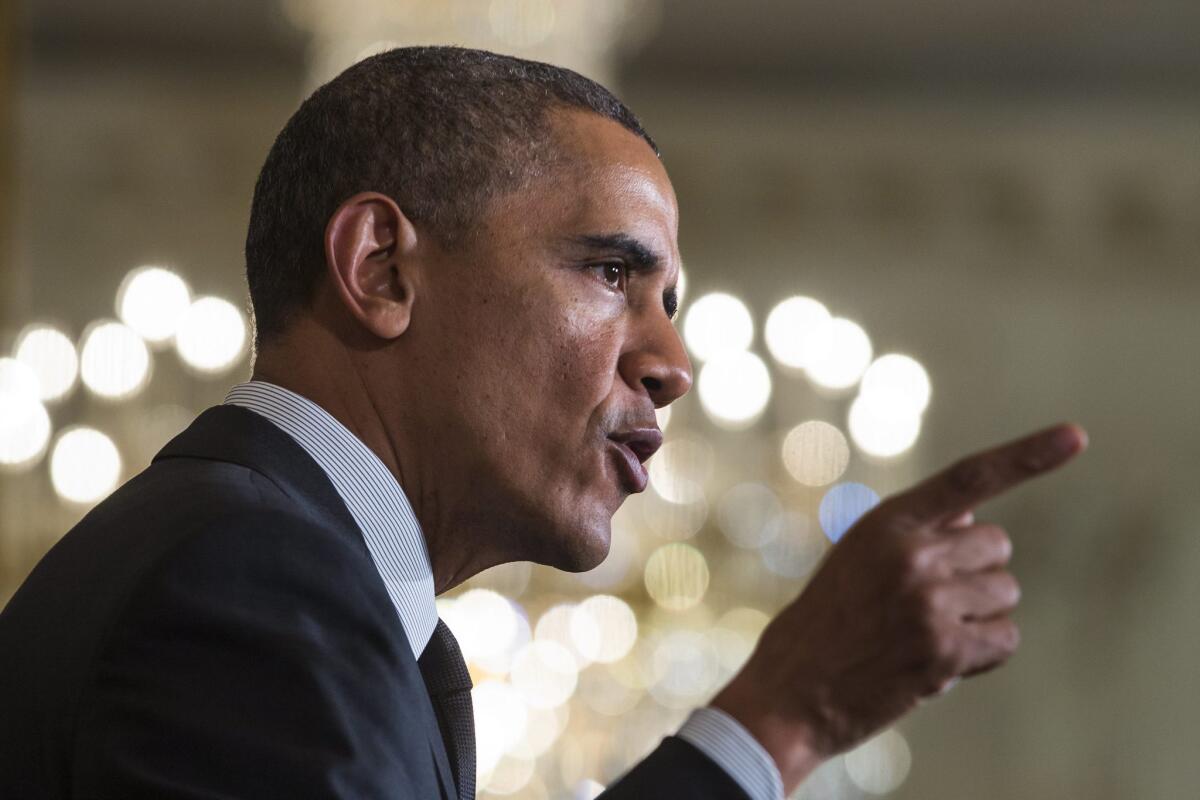Op-Ed: A higher minimum wage -- at what cost?

- Share via
Washington politicos want to know which way popular winds are blowing so they can set their sails accordingly. Rarely, though, are they as explicit as President Obama in citing public opinion as a justification for policy. When pressed to defend his call for a $10.10 minimum wage, Obama routinely points to the November 2013 Gallup poll wherein 76% of respondents said they favored a higher minimum wage. A higher minimum wage is “what America wants,” asserts the president.
Well, if Washington is going to do “what America wants,” the president should propose slashing foreign aid, because some 61% of Americans favor that decision (Kaiser Family Foundation, 2013). And what should Obama do about the federal budget? Poll respondents overwhelmingly (85% per Robbins/Shaw, March 2013) want budget deficits closed and even favor a constitutional amendment to achieve that outcome. Why hasn’t Obama acceded to these opinion-poll demands?
There are evident problems with poll-driven policy development. To begin with, pandering to polls isn’t real leadership; poll-driven decisions are instead the epitome of “leading from behind.” Further, poll responses vary significantly over time and circumstances. Five years ago, 58% of Americans opposed gay marriage (as did, coincidentally, Obama). Today, 59% approve of same-sex marriage (USA Today/Gallup, 2014).
Poll responses also vary with respondent’s knowledge. Most respondents who want to jettison foreign aid, for example, think it consumes 25% to 30% of the federal budget. It doesn’t come close to that. If bad information taints opinion polls, policy reliance on those same polls is inherently fraught with danger.
Raising the federal minimum wage sounds good to the average Joe and Jane. But do they realize a wage hike will cause job losses, or more precisely, a decrease in job growth? Professional economists are remarkably consistent on that question: 79% say the trade-off exists. The percentage would be even higher if the question were amended to take into account the magnitude of mandatory wage hikes.
This overwhelming consensus relies not just on the latest Congressional Budget Office report (which projects a 500,000 loss of job growth from Obama’s proposed 40% minimum wage hike), but also from an impressive collection of empirical studies and, ultimately, the core theoretical principle that downward-sloping demand curves are a universal phenomenon: Higher prices reduce quantity demanded. The only interesting question is how large the trade-off is, not whether it exists at all.
Raising the minimum wage from $7.25 to $8 wouldn’t cause many job losses. That’s because market wages have moved up since 2009, when the $7.25 floor was implemented. Even McDonald’s, the current target of minimum-wage protests, pays entry workers at least a buck more than the federal minimum. Only an “effective” wage hike — one that exceeds market-based wages — actually increases wages or causes job losses. Obama’s increase to $10.10 for the federal minimum more than qualifies as an effective wage hike and will surely lead to fewer jobs.
In assessing those losses, several facts are relevant. First, nearly everyone starts out in a minimum wage job. Second, few people stay at minimum-wage jobs very long; they move up the wage scale quickly with experience and employer references. Third, a majority of both teen and adult minimum-wage workers live in households with other, higher-wage workers. Single moms who hold minimum-wage jobs (the favorite focus of the popular media) stay neither single moms nor at minimum wage jobs very long.
All of this means that an effective wage hike will delay labor-market entry for teens, immigrants and other low-skilled workers who need access to that first step on America’s mobility ladder. So, there is a downside to minimum-wage hikes.
That doesn’t preclude raising the federal minimum. As noted above, it’s a trade-off issue: Will the gain to workers who get higher wages outweigh the loss to workers who confront diminished job opportunities? That’s a policy question that must be answered with empirical data and social priorities.
Science, not opinion polls, should guide decisions on minimum-wage policy. If the president insists on using opinion polls to fashion policy, he should focus on the Gallup poll that says only 40% of America approves the way he is handling the economy.
Brad Schiller is emeritus professor of economics at American University and the author of “The Economy Today.”
More to Read
A cure for the common opinion
Get thought-provoking perspectives with our weekly newsletter.
You may occasionally receive promotional content from the Los Angeles Times.









